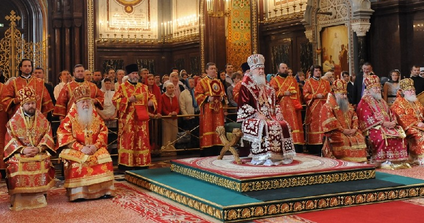
Sandro Magister skriver om dette viktige møtet, som etter planen skal avholdes om noen få uker, 19. til 26. juni:
There hasn’t been one for more than a thousand years, it’s been in the works for sixty years, and it has finally been convened for this Pentecost, which for the Eastern Churches falls on June 19 this year.
But just as the launch draws near, the much-implored pan-Orthodox Council is at risk of falling through.
And yet everything seemed to be moving in the right direction. At the end of January the heads of the fourteen Orthodox Churches of the Byzantine tradition, meeting in Chambésy, Switzerland, had come to a final agreement on the venue of the Council (the island of Crete), its starting date (June 19), its duration (until June 26), the procedural rules, and the documents to be brought up for discussion, five of them, on the following topics:
– the autonomy of the Churches and the manner of proclaiming it;
– the importance of fasting and its observance today;
– the sacrament of marriage and its impediments;
– the relationships of the Orthodox Church with the rest of the Christian world;
– the mission of the Orthodox Church in the contemporary world in regard to peace, freedom, and brotherhood among peoples.On each point the voting was unanimous on the part of all fourteen delegations, except for the rules and the document concerning marriage, not approved by the patriarchate of Antioch. So all of the signs were good, in spite of knowing that at a pan-Orthodox Council only that which is unanimously approved is valid, and that every modification of a rule or document must also have the agreement of all. …
…. The most serious divergences, however, especially concern one of the five documents that will be discussed at the Council, the one on relations between the Orthodox Church and the rest of the Christian world, also available in English and French:
On April 22, the patriarchate of Bulgaria declared unacceptable some passages of points 4, 5, 6, 12, and 16 of the document that it had however approved three months before.
The document, in the judgment of the Bulgarian patriarchate, errs theologically, dogmatically, and canonically in failing to recognize that outside of the Orthodox Church there is no other “church” but only heresies and schisms; that Christian unity has never been lost, because the Orthodox Church has always been united and will always be so; that those who have fallen into heresy and schism must first return to the Orthodox faith and give obedience to it before being accepted in that which is the only true Church.
As a result, the patriarchate of Bulgaria has warned that it will approve the document only if it is rewritten at the Council as it requests. If not, it will not sign it and therefore it will lack the unanimity necessary for approval. … …
John Allen skriver også om dette møtet; 7. juni startet han artikkelen Leading cleric says Orthodox Church’s ‘Vatican II’ is a go slik: «»Unity is an objective, not a given,» says the Rev. John Chryssavgis, an archdeacon and theological adviser to Patriarch Bartholomew of Constantinople. «It may be there spiritually and liturgically and sacramentally, but to make it visible is hard, painful, slow work, and it takes time.»»
Og 12. juni startet han artikkelen Gut-check time in June for both Orthodox and Catholics slik: «Catholics may be tempted to see June’s «Holy and Great Council» of the Orthodox churches as having nothing to do with them, but that’s a serious mistake. Catholics have an investment in whether the Orthodox get their act together for theological, pastoral, and political reasons.»

De håper at deres møte også kan bidra til forsoning der hvor det fins spenninger mellom gresk-katolikker og ortodokse.
Det er ikke så enkelt. Dette handler om hvordan vi skal løse problemene innad i våre patriarkater, hva slags forhold man skal ha til katolikker og andre trossamfunn og ikke minst en ordlyd som ei kan forandres i henhold til kirkens kànoner, men som allikevel må være klar og tydelig. (Det gamle treet må skinne og vise sin storhet, i en ny og overmodig verden).
Gresk-katolikker er èn ting og slettes ikke hovedgrunnen for disse samtalene.Husk at denne prosessen begynte i 1966.